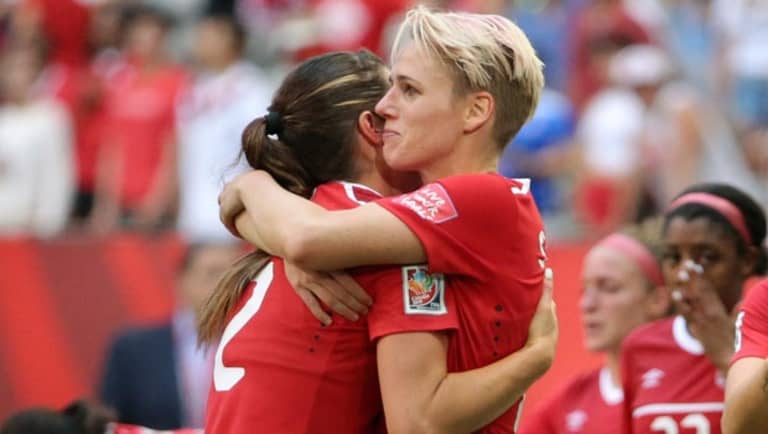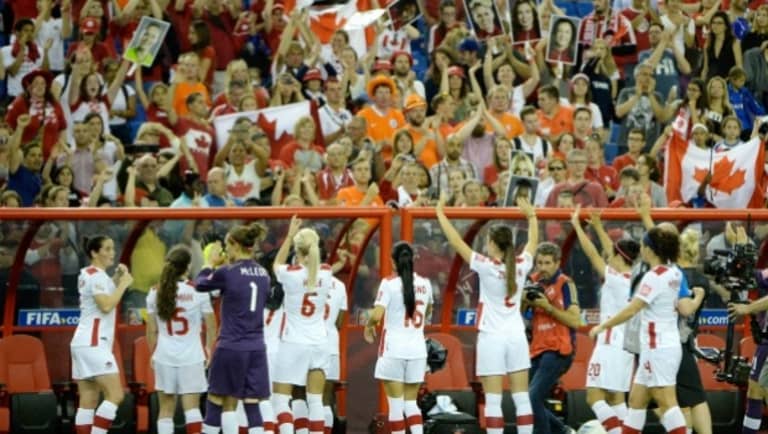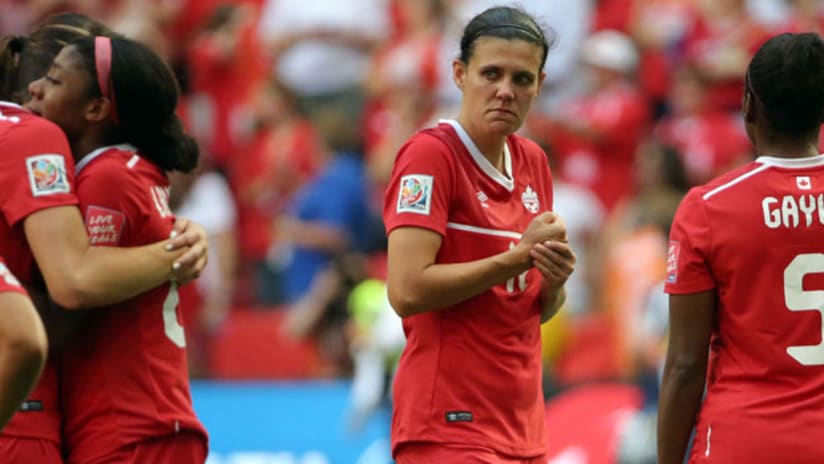So, was this Women’s World Cup a success or a failure for Canada?
That, for some reason, seems to be the burning question for many up here, in the aftermath of our 2-1 loss to England in the quarterfinals on Saturday. The problem is that without establishing clear expectations ahead of time, it’s impossible to properly evaluate the “success” (or lack thereof) of any endeavor.
Many Canadians had formed an impression of the team based upon two things: the exhilarating run to a bronze medal at the 2012 Olympics, and head coach John Herdman’s perpetual insistence that his team was aiming for the final of the 2015 World Cup.
And sure, if those two things represented the entirety of your background on the squad, you could be forgiven for expecting that Canada’s place in the World Cup final (or, at least, the semifinals) was a fait accompli before the first ball was kicked. If that was your expectation for this team, then perhaps this outcome represents a failure.
But the reality is, and always was, that from the moment we knew the World Cup draw, Canada – based on its form in the last two years and the condition of its player pool – could be reasonably expected to reach the quarterfinals, where they’d likely meet an opponent against whom they could just as easily win or lose.

That is precisely how it turned out. Unfortunately for the 54,000 at BC Place and millions watching on television, on this occasion it was a loss.
Some say that with Canada playing hosts, expectations should have been higher. Sure, it’s not unprecedented for the host of a major tournament to have an apparent out-of-body experience and perform at much higher levels than expected. This, however, was a team that was hamstrung from the start by injuries and other circumstances.
The team was always going to be missing its best playmaker in Diana Matheson (she made a brief cameo appearance against England, but that’s it). Due to injuries, Canada’s starting back line in its opener consisted of four players with zero prior World Cup experience (one of whom, Josée Bélanger, isn’t even a defender and another, Lauren Sesselmann, who was fresh off major knee surgery).
The team’s main striking option, Melissa Tancredi, missed a year and a half of play following the Olympics and never regained her scoring touch. And the team’s generationally transcendent player, Christine Sinclair, has seen a major shift in her on-field role since the London Games.
Sinclair, for the better part of a decade, carried the team on her back and bossed them into results they wouldn’t have otherwise obtained. But since London, she has – as a function of the passage of time, as much as anything – transitioned into more of an attacking midfielder role, using her supreme game sense to set up scoring opportunities for her teammates.
Canada reached the podium in London because its key players all came together to have massive performances at exactly the right time. That may have represented the zenith for a golden generation of Canadian talent. So does that make this World Cup a failure, or simply a regression to the mean?
Believe it or not, this was Canada’s second-best ever result at the Women’s World Cup, behind a fourth-place finish in 2003. And it comes in a tournament where Canada’s two best and most consistent performers were a pair of 20-year-olds: Kadeisha Buchanan and Ashley Lawrence.

Those two, along with World Cup teammate Jessie Fleming and a host of other youngsters on Canada’s team at next month’s Pan-American Games, will form the backbone of the team in the long road towards the 2019 Women’s World Cup. By that time, many members of this golden generation will have put their national-team careers behind them (voluntarily or otherwise).
The idea that Canada was going to win the 2015 World Cup at home was always a nice narrative and, given their favorable draw, a not-entirely-ridiculous possibility. But when the Canadian Soccer Association renewed Herdman’s contract through to 2020, it was a tacit admission that this World Cup was a transitional one.
While the loss to England – in an eminently winnable game – is bitterly disappointing for everyone following the team, deeming this tournament a “failure” for Canada falls somewhere on the spectrum between benign ignorance and malicious trolling. In any event, it’s hogwash.
But given that a berth in the semifinals was there for the taking, it seems somewhat disingenuous to deem the tournament a success at this point. Sure, the Canadian players gave it their all, but can’t we assume that all members of all teams did the same? Such devotion is presumably a prerequisite of participation in a World Cup.
In the end, the team provided the home crowds with some memorable and exciting moments, and some glimmers of hope about what the future will hold.
Perhaps that excitement will translate into ongoing, sustained support for the Canadian national teams, in a way that helps ensure they can produce another golden generation in the future. Then, and only then, could we truly consider this Women’s World Cup a success.













